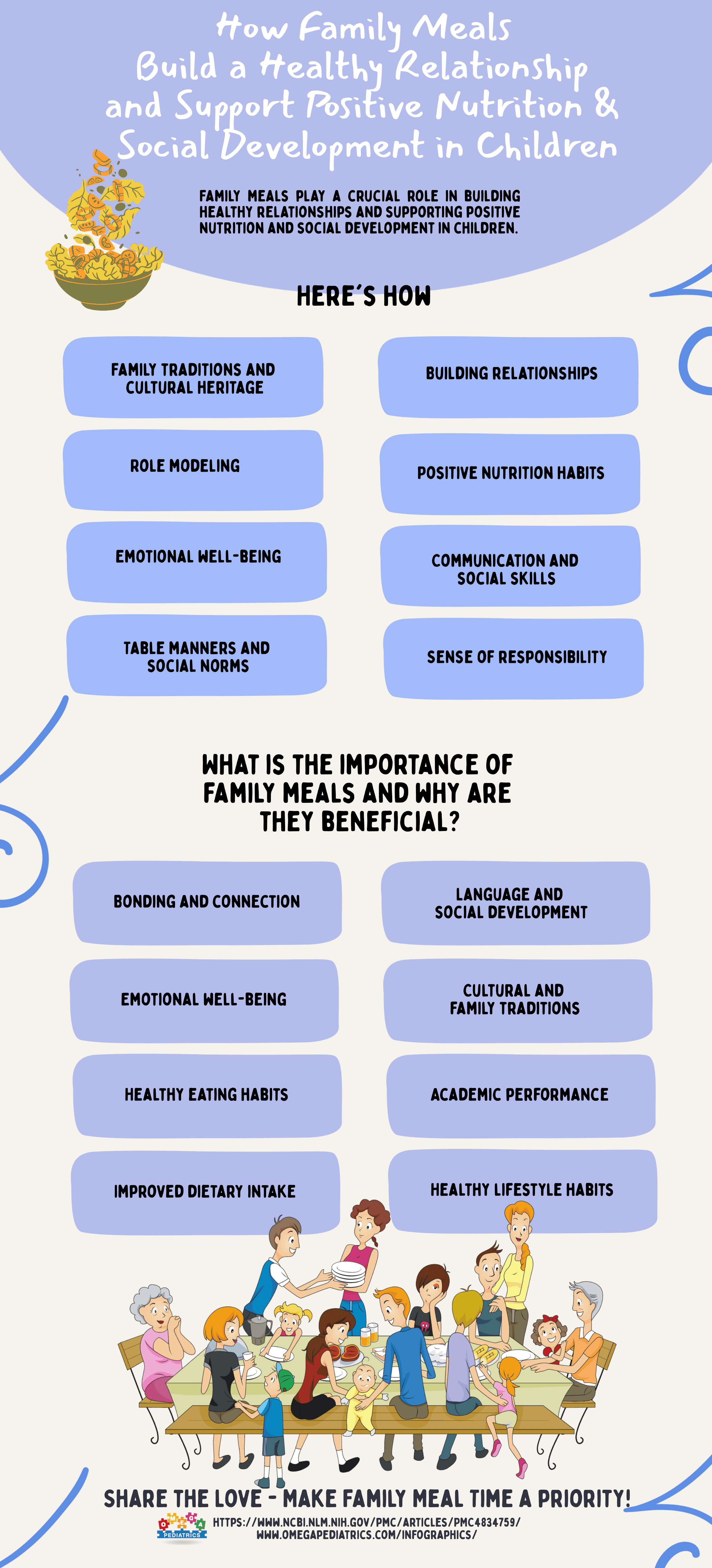
Family meals play a crucial role in building healthy relationships and supporting positive nutrition and social development in children. Here’s how:
- Building relationships: Family meals provide an opportunity for family members to connect, share experiences, and build strong relationships. Sitting down together at mealtime allows for quality time, conversation, and a sense of togetherness. Regularly sharing meals strengthens family bonds and fosters a supportive and loving environment.
- Positive nutrition habits: Family meals can promote positive nutrition habits in children. When parents or caregivers model healthy eating behaviors, children are more likely to adopt those habits. Eating together as a family encourages the consumption of nutritious foods, such as fruits, vegetables, whole grains, and lean proteins. It also allows parents to monitor and guide children’s food choices, promoting a balanced and varied diet.
- Role modeling: Family meals offer an opportunity for parents to be positive role models for their children. Children observe their parents’ eating behaviors, portion sizes, and food choices. When parents prioritize nutritious foods and practice mindful eating, children are more likely to follow suit. By setting a good example, parents can influence their children’s attitudes and behaviors towards food.
- Communication and social skills: Family meals facilitate communication and social interaction. Engaging in conversations during meals promotes the development of language skills, listening skills, and the ability to express thoughts and opinions. It encourages children to actively participate in discussions, ask questions, and learn effective communication and social etiquette.
- Table manners and social norms: Family meals provide an opportunity to teach children about table manners, etiquette, and social norms. They learn to use utensils properly, wait for others to finish speaking before talking, take turns, and engage in polite conversation. These social skills are essential for children to navigate social situations and develop respectful and considerate behavior.
- Family traditions and cultural heritage: Family meals allow families to celebrate and preserve their traditions and cultural heritage. Sharing traditional meals, preparing family recipes together, or following customs and rituals during meals instill a sense of identity, pride, and appreciation for one’s cultural background. This strengthens family bonds and creates a sense of belonging.
- Emotional well-being: Family meals contribute to positive emotional well-being in children. The supportive and nurturing environment during mealtime allows for open communication, sharing of experiences, and emotional support. Children feel valued, heard, and connected to their family members, which promotes a sense of security, belonging, and overall emotional well-being.
- Sense of responsibility: Involving children in meal preparation and planning can foster a sense of responsibility and ownership. When children participate in choosing and preparing meals, they develop important life skills, such as meal planning, cooking, and understanding food ingredients. This involvement can also increase their appreciation for the effort and care that goes into providing nourishing meals.
What is the importance of family meals and why are they beneficial?
- Bonding and connection: Family meals provide an opportunity for family members to come together, connect, and strengthen their bonds. It allows for quality time and shared experiences, promoting communication, conversation, and a sense of belonging within the family unit.
- Emotional well-being: Eating meals together as a family creates a supportive and nurturing environment. It offers emotional support, encourages positive interactions, and provides a space for open discussions. This can contribute to improved emotional well-being, increased self-esteem, and reduced feelings of isolation or stress.
- Healthy eating habits: Family meals can positively influence children’s eating habits and food choices. When parents or caregivers model healthy eating behaviors and offer a variety of nutritious foods during meals, children are more likely to develop healthy eating habits and preferences. Regular family meals also provide an opportunity to teach children about balanced nutrition and the importance of making wholesome food choices.
- Improved dietary intake: Research has shown that individuals who eat meals with their families tend to have a more nutrient-dense diet. Family meals often include a wider variety of fruits, vegetables, whole grains, and other nutritious foods. Additionally, family meals can help reduce the consumption of unhealthy foods and beverages, such as sugary snacks and soft drinks, when healthier options are readily available.
- Language and social development: Family meals offer a natural setting for children to develop language and social skills. Through conversations and interactions during meals, children learn to express themselves, share their thoughts, listen to others, and engage in meaningful discussions. This promotes language development, vocabulary expansion, and social etiquette.
- Cultural and family traditions: Family meals provide an opportunity to celebrate and preserve cultural and family traditions. Sharing traditional meals or recipes, discussing family stories or values, and engaging in customs and rituals during meals help children develop a sense of identity and appreciation for their cultural heritage.
- Academic performance: Studies have shown a positive association between regular family meals and improved academic performance in children. The structured and supportive environment of family meals can enhance cognitive development, communication skills, and overall mental well-being, which may contribute to better academic outcomes.
- Healthy lifestyle habits: Family meals can extend beyond just eating together. They can also involve engaging in physical activity, such as walking or playing together after the meal, promoting a holistic approach to a healthy lifestyle. These activities further reinforce the importance of regular exercise and create healthy habits as a family unit.
Conclusion
In conclusion, family meals play a vital role in fostering healthy relationships and supporting positive nutrition and social development in children. These shared meals provide a platform for bonding, communication, and emotional well-being. By serving as positive role models, parents influence children’s eating habits and behaviors. Family meals contribute to the development of social skills, table manners, and a sense of responsibility in children. Additionally, they offer a space to celebrate cultural traditions and create lasting family memories. The benefits extend to improved dietary intake, enhanced academic performance, and the establishment of healthy lifestyle habits. Embracing the importance of family meals can contribute significantly to the overall well-being and development of children.



